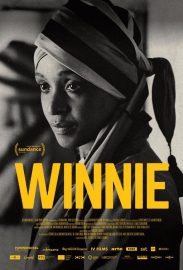Enjoy a free preview via Film Discovery! Click here !
Enjoy a free preview via Film Discovery! Click here !
Enjoy a free preview via Film Discovery! Click here !
Enjoy a free preview via Film Discovery! Click here !

https://www.filmplatform.net/product/winnie
Winnie Madikizela Mandela is one of the most misunderstood and intriguingly powerful contemporary female political figures. Her rise and seeming fall from grace, bears the hallmarks of epic tragedy. For the first time, this film pieces together and properly considers her life and contribution to the struggle to bring down Apartheid from the inside, with intimate insight from those who were closest to her and with testimony from the enemies who sought to extinguish her radical capacity to shake up the order of things.

I made three films in South Africa and interviewed Nelson Mandela for two of them,but I was always intrigued by Winnie, and felt a little unsettled by the adulation that was poured on her husband, while she was cast as the fallen woman. Charlie Mingus’s 1963 masterpiece, ‘The Black Saint and the Sinner Lady’ seemed to capture the essence of their legacy, in the album title. Her reputation amongst people I encountered in Europe and the States was unshakably negative. And yet in South Africa, and not only in the townships, Winnie was loved and respected and she continued to live among her people in Soweto.
As I tried to square that love on the ground with the portraits I found, in journalistic biographies and BBC investigative documentaries, which so over-determined a Western view of her, I became more and more fascinated by the wide chasm between the two. Something was amiss. A story needed telling. And I’d go into the dark side of the Mandela story to find it.
The timing for an approach to Winnie had to be right. My Sowetan partner, Peter Makurube, counseled that we wait until she completed her mourning, a year after Nelson Mandela was buried.
It was clear that I was not making a puff-piece and needed to get close enough to Winnie, to peel away the layers of story-ing that inevitably accompany a long and dramatic life. Her daughter Zindzi was our first port of call and as she gained confidence, trust was established. I interviewed Winnie four times over a period of two years and was able to peel away the layers, to get closer and closer to the truth of her experience, her emotions and her politics.
At the same time, I interviewed a whole host of her friends and collaborators, but also tracked down her enemies and began unraveling a story involving psychological warfare and other dirty-tricks campaigns. I came to the conclusion that she and Nelson Mandela were two sides of the same powerful coin and something terrible had been done to them.
Pascale Lamche is an award winning filmmaker who has made feature documentaries and series both as a writer/producer, and writer/director for key broadcasters internationally, and whose films have been premiered at many international film festivals including Edinburgh International Film Festival, Locarno International Film Festival, Dublin International Film Festival, Toronto Documentary Festival, FIPA Documentary Film Festival and travelled the world.
The late Peter Makurube was the guiding spirit, presenter and founder in 1991, of the legendary MONDAY BLUES, a Johannesburg based community arts programme that for decades launched many stars in music, poetry, hip- hop, jazz, reggae, folk. He was a journalist and broadcaster, presenter, poet, and associate producer on numerous documentaries.
Christoph Jörg has been producing and commissioning documentaries for over twenty years. From 1994 to 2008, he was Senior Commissioning Editor at ARTE FRANCE in Paris. He was overseeing the output of a huge range of programs from international series like “Why democracy?” and “Steps to the Future” to documentary strands like THEMA, and commissioned more than 350 feature documentaries which won numerous international awards and have been shown in festivals all over the world.
Jörg founded PUMPERNICKEL FILMS in 2009 in Paris. Since then, he has produced or coproduced a wide range of award winning documentaries, working with a line-up of talented and acclaimed filmmakers, including the following feature length films for movie theaters and television broadcast:
Giles Gardner has spent over 20 years working in post-production, beginning as an assistant film editor working with an array of internationally acclaimed film-makers such as James Ivory, Gillis McKinnon, Fred Schepisi, Jean-Jacques Annaud. He currently lives in Paris and has edited numerous documentaries, drama and advertising, and has contributed to the ‘Emergence’ and ‘Greenhouse’ film programs.